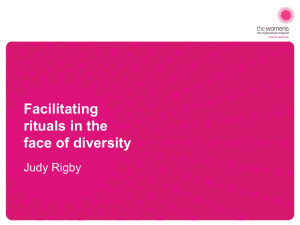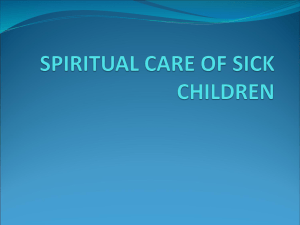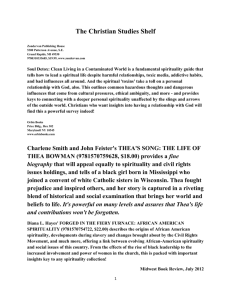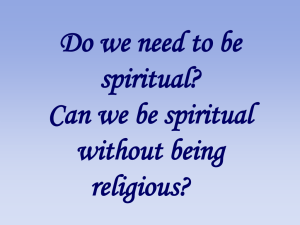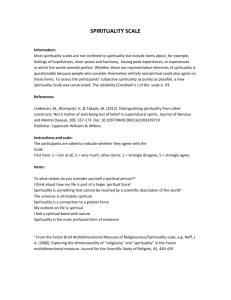Scope of Practice
advertisement
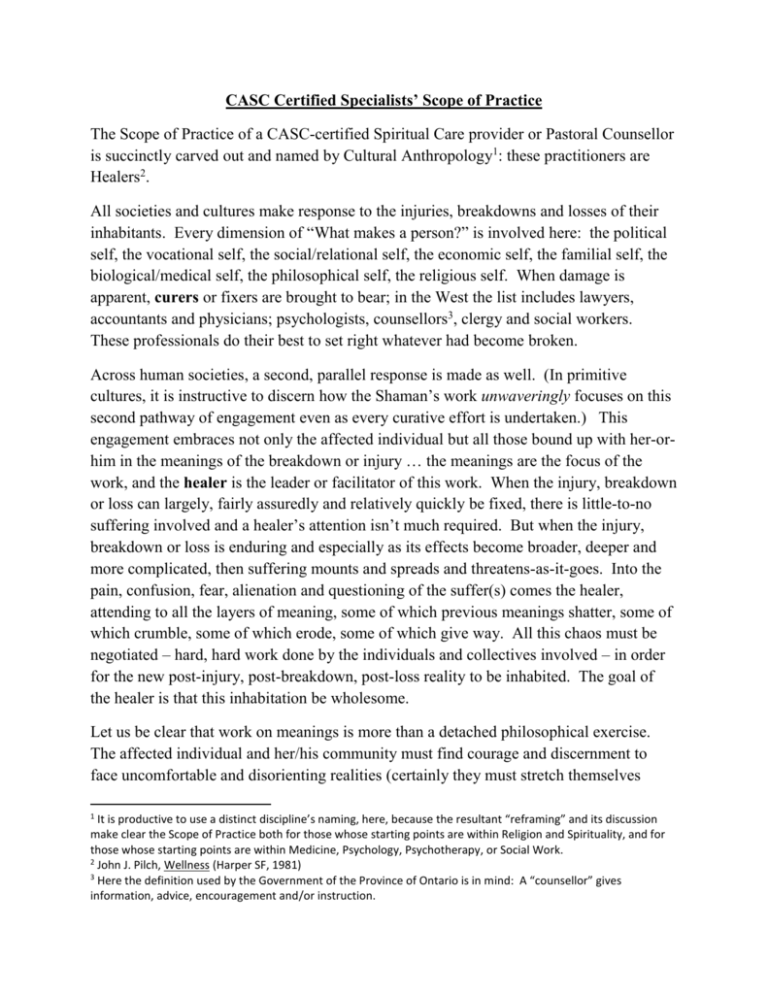
CASC Certified Specialists’ Scope of Practice The Scope of Practice of a CASC-certified Spiritual Care provider or Pastoral Counsellor is succinctly carved out and named by Cultural Anthropology1: these practitioners are Healers2. All societies and cultures make response to the injuries, breakdowns and losses of their inhabitants. Every dimension of “What makes a person?” is involved here: the political self, the vocational self, the social/relational self, the economic self, the familial self, the biological/medical self, the philosophical self, the religious self. When damage is apparent, curers or fixers are brought to bear; in the West the list includes lawyers, accountants and physicians; psychologists, counsellors3, clergy and social workers. These professionals do their best to set right whatever had become broken. Across human societies, a second, parallel response is made as well. (In primitive cultures, it is instructive to discern how the Shaman’s work unwaveringly focuses on this second pathway of engagement even as every curative effort is undertaken.) This engagement embraces not only the affected individual but all those bound up with her-orhim in the meanings of the breakdown or injury … the meanings are the focus of the work, and the healer is the leader or facilitator of this work. When the injury, breakdown or loss can largely, fairly assuredly and relatively quickly be fixed, there is little-to-no suffering involved and a healer’s attention isn’t much required. But when the injury, breakdown or loss is enduring and especially as its effects become broader, deeper and more complicated, then suffering mounts and spreads and threatens-as-it-goes. Into the pain, confusion, fear, alienation and questioning of the suffer(s) comes the healer, attending to all the layers of meaning, some of which previous meanings shatter, some of which crumble, some of which erode, some of which give way. All this chaos must be negotiated – hard, hard work done by the individuals and collectives involved – in order for the new post-injury, post-breakdown, post-loss reality to be inhabited. The goal of the healer is that this inhabitation be wholesome. Let us be clear that work on meanings is more than a detached philosophical exercise. The affected individual and her/his community must find courage and discernment to face uncomfortable and disorienting realities (certainly they must stretch themselves 1 It is productive to use a distinct discipline’s naming, here, because the resultant “reframing” and its discussion make clear the Scope of Practice both for those whose starting points are within Religion and Spirituality, and for those whose starting points are within Medicine, Psychology, Psychotherapy, or Social Work. 2 John J. Pilch, Wellness (Harper SF, 1981) 3 Here the definition used by the Government of the Province of Ontario is in mind: A “counsellor” gives information, advice, encouragement and/or instruction. beyond habitual thinking and behaviours); they must exercise their fullest capacities around desires, options and choices; they must engage in actions, and then in evaluation – constant reflection! – so as to ‘tune’ those actions; all of this in the face of problematic experiences and in pursuit of preferred outcomes. The healer is present to all aspects of this meaning-work as facilitator/teacher/provocateur/midwife/coach/guide and safety net. Let us be clear, furthermore, that what comes from work on meanings is not a straight upward climb to relief and glory. At the very least, the presenting complexity is bound to get bigger and harder before it ever gets ‘better’, and ‘better’ never includes a return to innocence. A healing journey increases capacities for love and hatred, hope and despair, confidence and fear, joy and sorrow, connection and alienation, strength and powerlessness. Using classical terms, this journey is a quest; it may take the wounded one through “the dark night of the soul”, it may end in “the promised land”; the only thing known for sure is that it is an exodus (in other words, the starting situation is purposefully left behind). It is needful that the curers/fixers of our society function, to the limits of their professional scopes of practice, as healers as well. It is equally needful that the full domain or scope of healing, the breadth of its practices and the completeness of its work, be recognized and wisely employed by our culture … i.e. that this specialization beyond what our curers/fixers have to offer us be fully utilized. Current naming for the set of healing disciplines as a whole is psychotherapy. Historically, in the West, it was arguably during a particularly messy plague in the eleventh century C.E. that healing was vivisected from curing, the Holy Roman Church maintaining the former practice and modern western medicine born to own the latter. In any case, western Spiritual Careproviders and Pastoral Counsellors stand squarely on the historical foundations even as they stand squarely among the modern and post-modern schools of psychotherapy. The centrality of Spiritual Care / Pastoral Counselling amongst the psychotherapies is here noteworthy, the fundamental truth of which is upheld by basic definitions. Let us agree that by capital ‘R’ “Religion” and “Religions” we point to the array of faith-andbelief-and-ritual-and-worship practices, or traditions, around the globe, from Aboriginal through Zoroastrian (“A” to “Z”). If we ask the question, “What is common across all such practices?”, in other words “What exactly is ‘religion’?” [which we will distinguish as ‘lower case r’ “religion”], our anthropologist colleagues answer that human beings everywhere wrestle with meaning questions, large and small, and come together in communities of shared stories and practices that embody the big questions, the big wrestling, and their best answers. It is the business of meaning-discovery and meaningbased-living that is “religion” [our lower-case ‘r’ “religion”]. The more some body asks meaning questions4, the more “religious” that body is, and the ‘higher’ they are on a lower-case-’r’ religion scale. This conceptualization is immediately applicable and useful within all of psychotherapy, because every client coming towards us, within some on-going injury / breakdown / loss experience, is living and telling a story confronting her/him/them with layer on layer of unwelcome meanings for their lives, and a healer – in the context of a caring, professional relationship – must seek fully to engage and promote that client’s lower-case ‘r’ “religious” sensibilities. A second pair of definitions is equally germane: Capital ‘S’ “Spirituality”, by general cultural consensus, can be defined as “one’s ultimate, over-arching organizational vision for life.” Clearly this conceptual framework is a significant resource for all healers to discover and engage in client work. A more focused definition makes of “spirituality” an assessment variable declaring where the client is found on the spectrum of ‘engaging in the meanings of their lives’: Lower case ‘s’ “spirituality” is the measure of capacity for meaning making; saying it perhaps more graphically, “‘spirituality’ is the breadth and height of the ‘playing field’ upon which one does one’s work in making one’s meanings5”. Much more can and must be said in exploring and applying even these basic concepts; again, they are raised here to demonstrate and indeed argue that Spiritual Care and Pastoral Counselling offer the culturally/historically/philosophically/religiously broadest-and-deepest-and-longest set of resources amongst the psychotherapies. Place and focus of practice vary. Pastoral Counsellors address the full broad range of injuries, breakdowns and losses to self, or to relationship, or to community, be they political, vocational, social/relational, economic, familial, biological/medical, philosophical or religious; and they do so in private practice or institutional settings. Spiritual Care-providers (historically sometimes termed “chaplains”) attend to injuries, breakdowns or losses that pertain within the institutions they serve, be they military, schools, prisons, general hospitals, psychiatric facilities, long term care facilities, hospice/palliative care teams, family health teams, whatever. 4 When a religious person wakes remembering a dream, she/he asks, “What does this mean in the context of my life?” When she/he becomes sick, the same question is applied. When she/he becomes aware of a persisting thought, emotion, behavior or relationship style in herself/himself, again this question. When she/he notes a change in the human or natural world around her/him, she/he asks, “What does this mean?” The not-religious person simply does not ask these meaning questions. 5 The person who dreamt and asks herself/himself, “What did that dream mean?”, is indeed being religious. If she/he answers, “I shouldn’t have eaten onions for dinner” and explores nothing more, she/he demonstrates limited (or ‘low’) spirituality. On the other hand, if she/he explores meanings across her/his life’s story, her/his family’s stories, her/his community’s stories, her/his culture’s story, her/his physical environment, her/his philosophical and ethical environment, her/his knowledge and beliefs, then she/he demonstrates ‘high’ spirituality. Lest there be any confusion, let it also be stated that Pastoral Counsellors and Spiritual Care-providers engage in the work regardless of the Religion or Spirituality of a given client. If the client is Secular Humanist and Atheist or Agnostic, or if the client is the Pope in Rome, the healer’s attention is to the client’s experience and the client’s resources for the meaning-making work at hand.



